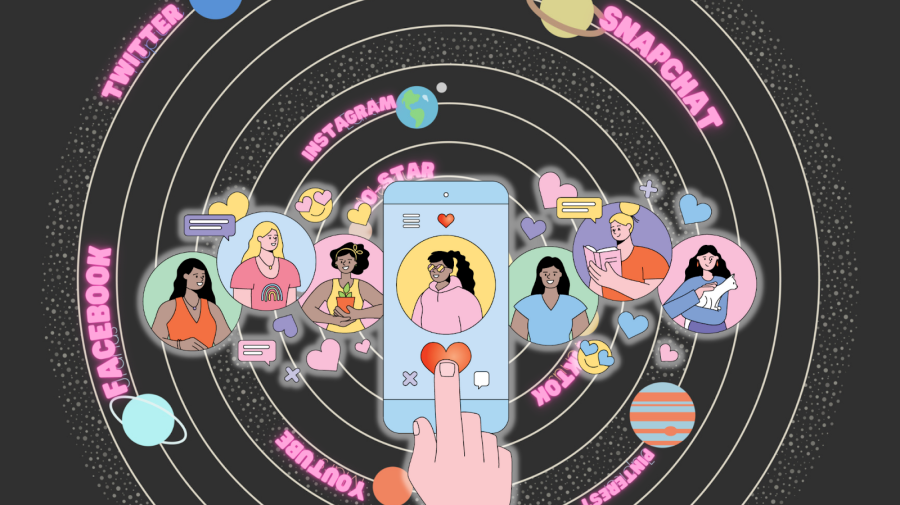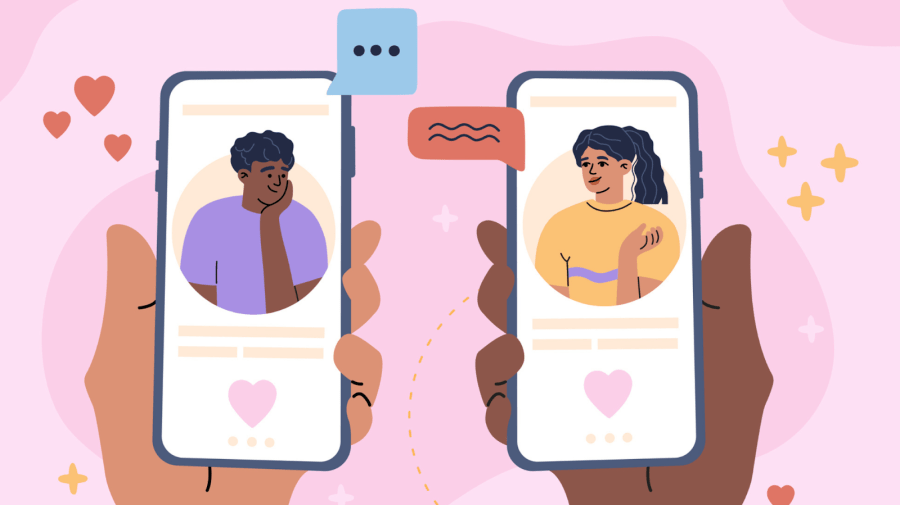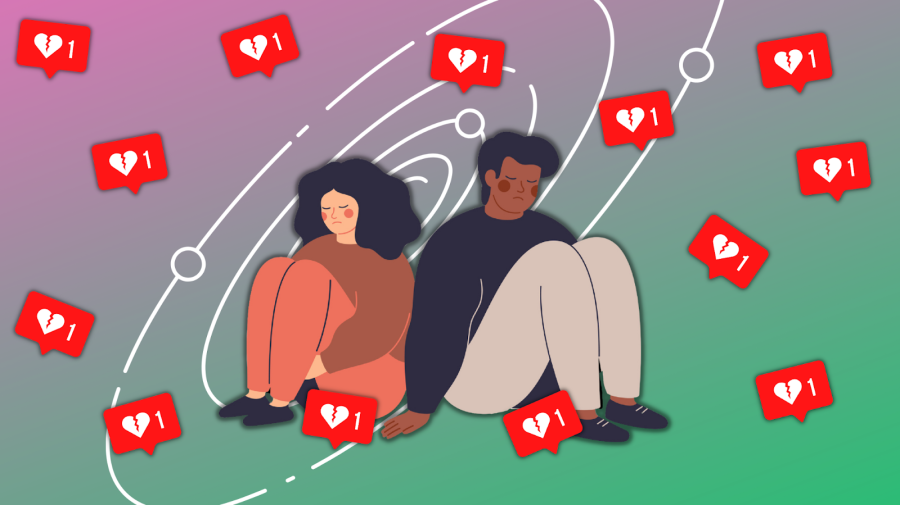
Dating in the current social media world is tricky. Imagine you’re dating someone and, one day, they suddenly cut off all direct and meaningful communication with you. Sounds a bit like ghosting, right? Well, say they break it off but, all the while, continue to engage with you more subtly on social media. Long-term relationships that end in a break up come with even more social media fallout. And this all relates to a common phenomenon in today’s digital (dating) age known as orbiting.
Your ex may no longer be actively commenting on your photos or sliding into your DMs, but maybe they like your posts, view your TikTok uploads, or continue to engage with you in other superficial ways on a regular basis. It’s possible they’re seeing your content thanks to those pesky algorithms. And, maybe, they’re interacting with your socials in good faith. Still, it can sting. Not to mention, maybe you’re also being fed their posts and photos, making it harder to move on post-breakup or ghosting.
Orbiting is certainly a newer dating occurrence — something we’re just starting to put a finger on. Now that we’ve named it, though, let’s delve into everything you need to know about orbiting and how the trend might be impacting your mental health.
What Is Orbiting?
Orbiting in dating is when you cut off direct contact with the person you’re dating but continue to engage with their content on social media. It’s been dubbed “the new ghosting,” and, following an essay by Anna Iovine in 2018, gained more momentum in the pop-culture discourse.
Maybe you haven’t been the orbiter, but have found yourself being orbited. No matter the case, orbiting generally stems from a person’s desire to keep a former romantic partner or ex in their “social orbit.” Engaging in orbiting can make you feel closer to your ex, which can ultimately lead to some real pitfalls and toxic behavior.
For example, an orbiter can track who their ex has been with and where they’ve traveled. Mostly, orbiting gives the perpetrator a fake sense of comfort — the feeling that their former lover is still on their radar.

The concept of orbiting is gaining tremendous popularity, especially online, because of the increased interconnectedness between dating apps and social media. As a result, many people experience a situation where they’re ghosted — or one of the partner’s calls it off after a few dates — only to find they’re still very much connected.
Because of the interconnectedness of it all, social media platforms might suggest you follow your now-ex or serve you their content because you still follow each other and, presumably, once talked a lot. Not to mention, if you’ve ended things with a Tinder date, there’s no guarantee that you won’t stumble upon them on Hinge or Bumble, too.
Multiple studies show that social media boosts the brain’s feel-good chemicals, all while providing a false sense of intimacy. For instance, using social media for just 10 minutes increases oxytocin levels by 13%, causing you to feel happier. A “like” on Twitter, Instagram, or Snapchat can be exciting when it comes from a crush or someone you’re actively dating, but the same form of interaction can feel extremely confusing, uncomfortable and infuriating when it comes from an ex.
So, Why Do People Orbit?
Orbiters do what they do for a variety of reasons, but Iovine, the author of the 2018 article on the topic, suggests three theories for why someone would suddenly end direct communication and still maintain a social media presence and connection. The first theory? It’s a power move. Psychologists suggest that maintaining a presence on somebody’s social media profile is a diplomatic measure. It’s a way of letting them know you’re on good terms.
Maybe you’ve stayed friends with distant relatives or old friends on social media, despite differing opinions and interests, just for the sake of smoother sailing, but, when it comes to dating, it’s not so simple. According to The Daily Beast’s Taylor Lorenz, an orbiter might be deploying this so-called “power move” in order to keep the door open with an ex.
But that’s just one of three reasons for orbiting. Iovine suggests that someone can orbit because they lack awareness of why that might not be okay. Maybe the orbiter didn’t take the break up as hard and can’t see why cropping up on their ex’s social media would be so hurtful, for example. But staying friends on Facebook or Instagram with an ex is more than just “keeping in touch” — it can feel challenging to untangle your feelings and move on if you’re constantly seeing what the orbiter is up to post your relationship.
And, finally, an orbiter might start circling you for the fear of missing out. Maybe they don’t feel ready to date you, but they’re concerned that if they were to eliminate you from their orbit completely, they’d miss an opportunity to reconnect later. After all, social media platforms allow for voyeurism and orbiting, at least in this case, is a way to keep tabs on a person the orbiter might want to date in the future.
Orbiting and Mental Health
Online dating and the various apps we use can already contribute to poor mental and emotional health. But, in many ways, turning to Tinder might feel like the only way to connect with potential partners. As we’ve noted in other dating discussions, “Match Group, the parent company of popular dating apps like Match, OKCupid, Tinder and Hinge, has seen a reported ‘15% increase in new subscribers’ during 2020.”
In Online Dating Is a Blessing and a Curse — But Mostly a Curse, Caleb Bailey writes that, “Dating app burnout was on the rise for a myriad of reasons in 2019 BC (Before COVID); verbal, emotional, and sexual harassment were par for the course that year. But once the pandemic hit, online dating became the sole recourse for millions of people around the globe.” So many of us are engaging in online dating, connecting our Instagrams with various dating apps. And that makes the toll all the worse when it comes to break ups and orbiters.
The relationship between orbiting and mental health has not been widely explored — yet. However, the existing scientific evidence on the phenomenon suggests that it has a negative effect on emotional and psychological well-being.

For instance, orbiting leads to mixed messages. Cutting off communication but keeping tabs on social media is… confusing, right? It raises a lot of questions. If you’re the one who is being orbited, these mixed signals might result in some conflicting feelings. Breaking off communication — no texts or calls — is a common way to help both parties move on after a break up. But keeping that social media presence — and, worse, passively “liking” an ex’s posts — might imply the orbiter does still care. Without a doubt, orbiting makes healing harder. After all, orbiting blurs boundaries and keeps you thinking about the person you’re supposed to be moving on from.
But it’s not just an orbiter’s direct actions that can mess with you. Sometimes, just seeing their posts pop up in your feed can be troubling. The phrase “no one posts their failures” on social media is true. Instagram users only post their best moments (and best lighting), so, when you get an ex’s highlights, it can lead to some big feelings.
Maybe you’ll feel they’ve curated this near-perfect feed to make you jealous, or, on the other hand, maybe seeing them having fun in the immediate wake of your breakup hurts your self-esteem. Did the relationship mean as much to them if they can seemingly move on so quickly?
Orbiting can also trigger a psychological response — confirmation bias. If you already hold a certain belief or feel a certain way, for example, searching your ex’s social media profiles for clues to support your perspective could lead you to spiral and ruminate. You might not even realize you’re orbiting someone. After all, taking a quick peek at someone’s social media reveals a lot, but it’s so commonplace that you might justify it as harmless. In reality, orbiting — no matter the intensity — can hurt all parties involved.
While it may be difficult to avoid orbiting altogether — especially the more passive forms of it like Instagram suggesting you follow an ex time and again — muting your ex could be the best course of action. A full-on blocking might seem intense and unnecessary, but intentionally tuning them out for a bit will likely do wonders for your mental health.






